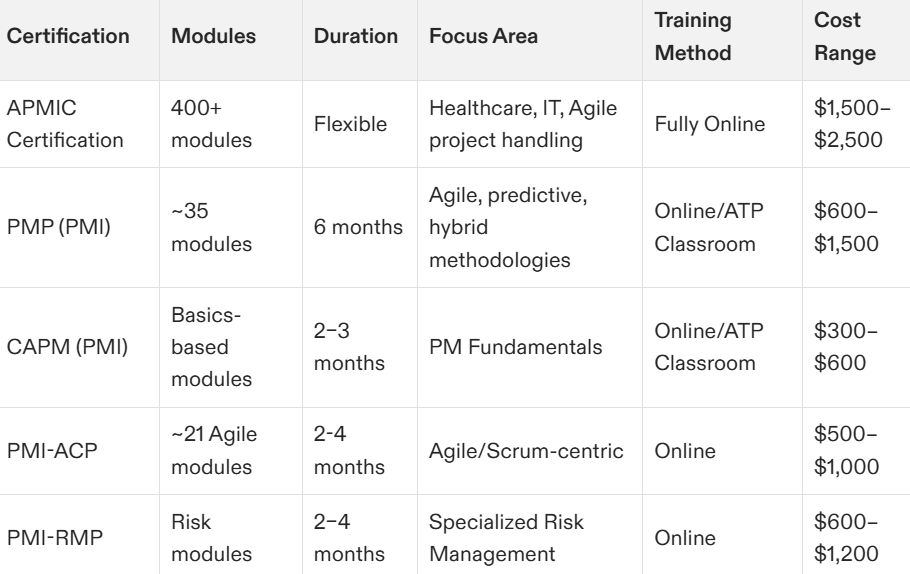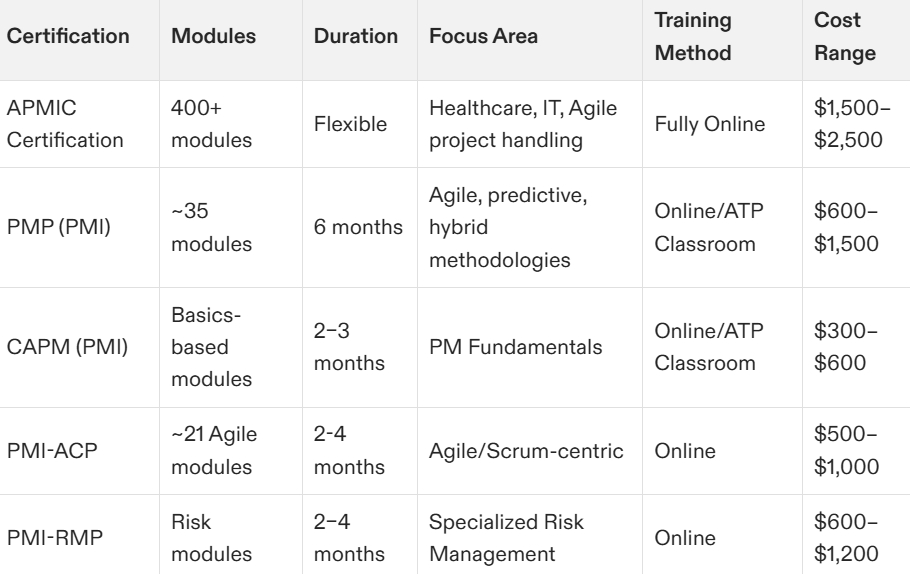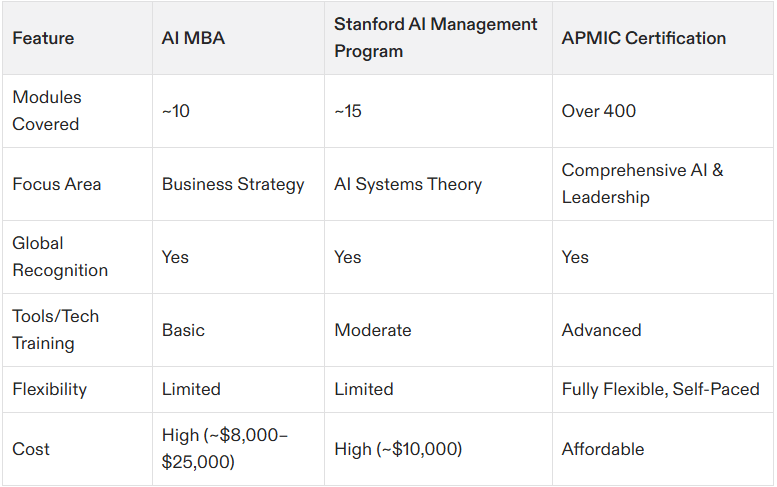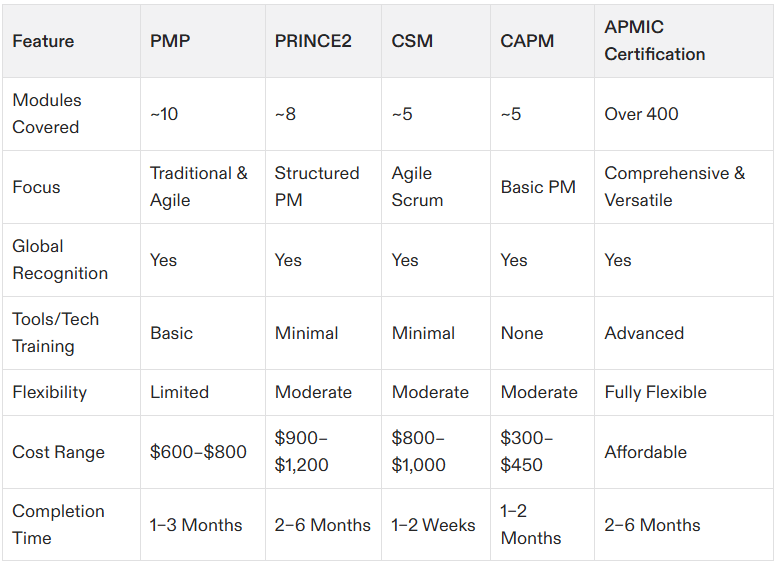Table of Contents
- What Is a Project Management Certification Professional?
- Why Choose a Project Management Certification Professional?
- Key Benefits of Project Management Certification Professional
- How to Earn a Project Management Certification Professional
- Comparing Project Management Certification Professional with APMIC
- FAQ About Project Management Certification Professional
- Certification Comparison Table
- Final Thoughts
Are you looking to take your project management career to the next level? Whether you’re just starting or expanding your credentials, earning a Project Management Certification Professional can solidify your expertise and open doors to high-level opportunities. Project management professionals are vital in industries like IT, healthcare, and construction, where delivering projects on time and within budget is critical.
This comprehensive guide will cover everything you need to know about the Project Management Certification Professional—its benefits, steps to earn it, exam details, and how it compares to alternatives like the APMIC Certification. Buckle up, and get ready to explore how this certification can transform your career.
What Is a Project Management Certification Professional?
The Project Management Certification Professional (PMCP) validates your knowledge, skills, and experience in leading and directing projects. Recognized globally as a gold standard in project management, the certification is designed for individuals who manage multiple project variables involving people, budgets, and deadlines.
Being a certified professional demonstrates your ability to align project goals with organizational strategy, manage stakeholders effectively, and handle unpredictable project challenges. For professionals seeking specialized knowledge, programs like the APMIC Certification offer advanced, industry-specific training with over 400 modules, making it an excellent complement to your PMCP.
Why Choose a Project Management Certification Professional?
1. Career Growth and Recognition
The Project Management Certification Professional boosts your credibility among employers and peers. It’s proof that you have met the rigorous requirements and professional standards expected by project management organizations worldwide.
2. Enhanced Earning Power
Certified professionals earn significantly higher salaries. Studies show that holders of certifications in project management can earn up to 20% more annually compared to their non-certified counterparts.
3. Global Acceptance
The PMCP is recognized across industries and countries, making it easier to transition into international roles with skills that match global best practices.
4. Comprehensive Skill Set
This certification builds your expertise in Agile, waterfall, and hybrid project management methods, equipping you with versatile tools to manage projects of all shapes and sizes.
If you're looking for a certification with industry-customized training, explore options like APMIC Certification, which focuses on niche areas like healthcare, IT, and risk management.
Key Benefits of Project Management Certification Professional
- Leadership Development – Become a recognized leader who can manage diverse teams and resolve conflicts effectively.
- Advanced Methodologies – Gain mastery of predictive, Agile, and hybrid methodologies, making you a versatile project manager.
- Strategic Planning – Learn how to align project outcomes with organizational goals for maximum impact.
- Industry-Agnostic Application – Applicable to IT, healthcare, finance, construction, and more.
For targeted growth in specific sectors, consider pairing your PMCP with certifications like APMIC. This ensures that your skill set satisfies the broad demands of organizational projects while meeting industry-specific expectations.
How to Earn a Project Management Certification Professional
Step 1. Check Eligibility
- Candidates typically need at least a high school diploma and professional project management experience. Alternatively, a bachelor’s degree combined with less experience may also satisfy eligibility requirements.
- Many candidates complete 35 hours of formal project management training before applying.
Step 2. Apply for Certification
Sign up through an authorized certification body and submit proof of your educational background, professional experience, and training. Many certifications, including the PMCP, have streamlined application processes online.
Step 3. Prepare for the Exam
Using study guides, reference materials, and mock tests aligned with frameworks like Agile and PMBOK increases your chances of passing. Consider enrolling in preparatory workshops to deepen your understanding.
Step 4. Take the Examination
The certification exam assesses your knowledge across key domains like planning, execution, and management of risks. It evaluates your applied understanding of predictive, Agile, and hybrid approaches.
For those who want to go deeper into specialized areas, certifications like APMIC Certification provide industry-focused modules unavailable in generalized programs.
Comparing Project Management Certification Professional with APMIC
While the Project Management Certification Professional (PMCP) provides an exceptional foundation in managing diverse projects using globally accepted frameworks, specialized certifications like APMIC take learning to the next level by focusing on specific industries and their unique requirements. Certification programs such as APMIC's Healthcare Project Compliance or IT Agile Workflow Automation are tailor-made for professionals working in highly regulated or technologically complex environments, helping them adapt global project management principles to a sector-specific context.
One of the standout features of APMIC Certification is its depth of coverage, with over 400 modules meticulously designed to address real-world challenges. These modules go beyond theory, focusing on actionable skills like regulatory compliance in healthcare, Agile adoption for IT teams, risk mitigation strategies, and stakeholder communication in multifaceted projects. This makes APMIC an invaluable resource for professionals who want to position themselves as problem-solvers and innovators in their industries.
FAQ About Project Management Certification Professional
1. What is the Project Management Certification Professional?
It’s a globally recognized certification verifying your expertise in managing a variety of project methodologies and addressing complex operational demands.
2. How does the APMIC Certification compare to PMCP?
While PMCP provides a broad understanding of project management, the APMIC Certification focuses on specialized industries like healthcare and IT with over 400 modules tailored for specific niches.
3. Are online options available for PMCP?
Yes, most institutions offering the PMCP certification allow candidates to complete their prep courses and exams entirely online. Similarly, the APMIC Certification offers flexible online learning solutions.
4. Who is the PMCP certification for?
It’s meant for professionals or aspiring project leaders who want to demonstrate competency in managing projects across industries.
5. Is the PMCP a good investment for my career?
Absolutely! It raises your credibility, earning potential, and global career prospects. Pairing it with an industry-specific certification like APMIC amplifies these benefits.
Certification Comparison Table

Final Thoughts
The Project Management Certification Professional is your gateway to becoming a recognized leader in project management. Its broad, industry-agnostic focus ensures you’re prepared to handle projects of all complexities across multiple sectors.
For those aspiring to elevate their expertise even further, the APMIC Certification provides targeted training tailored to the unique demands of healthcare, IT, Agile, and more. Combining PMCP and APMIC certifications ensures you’re on the cutting edge of both strategic and specialized project execution.
Begin your certification process today and build the skills necessary to lead successful projects, inspire teams, and exceed expectations in any professional setting. With determination and the right credentials, your career in project management can reach unprecedented heights.





